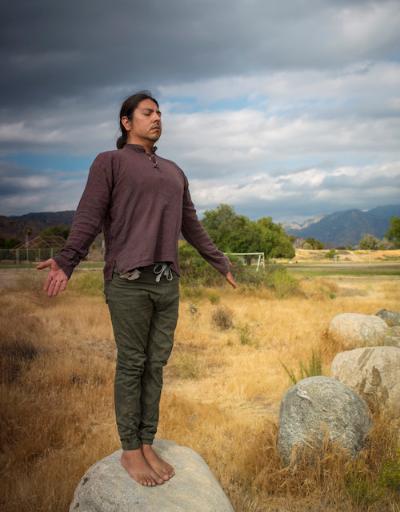Alejandro Godinez '18

Q. What made you decide to pursue an MA in Yoga Studies?
I knew I wanted to go back to school after I finished my BA, but I couldn't find a program that felt exactly right, that I could totally commit to. In the meantime, I began teaching yoga and kept diving deeper into any and all aspects of it that I could find access to. Then, one day I stumbled across the MA in Yoga Studies in an online article. I went to the program website, and as I scrolled through the courses discovered I was interested in all of them. The program tied together what had previously seemed like disparate interests in anatomy/kinesiology, philosophy, and Indian languages. It seemed like the obvious next step on the path I was pursuing.
Q. What was it like studying Sanskrit in the program?
Since I've always been interested in languages, studying Sanskrit was one of my favorite parts of the program. It helped that I had studied Hindi first, and I definitely recommend incoming students take the time to learn at least the script (Devanagari), and maybe even peruse some of the basic grammatical structures, before beginning the program. Dr. Patil does a great job of making learning Sanskrit fun, but as with anything, how much you get out of it also depends on how much you put into it. Because I really wanted to focus on language, I attended extra study and translation groups outside of class time and chose to focus many of my papers on language and translation.
Q. What surprised you most about the MA in Yoga Studies?
One of the things that surprised me was the range of backgrounds people had when entering the program and the range of interests that emerged as we progressed through our coursework. We all took the same classes, but it was amazing and inspiring to hear how each person integrated the information differently and chose a unique thesis project.
Q. Tell us a little about your thesis project, and how that came about.
My thesis was entitled "Word and Silence, Consciousness and Embodiment in the Yoga Sutra and Beyond." It arose as a way for me to pull together a few topics that I kept circling back to throughout my studies (and really, throughout my life). As I was contemplating what to focus on for my thesis, I wanted to anchor my work in a text, and although it has been talked about and written about quite a bit, I felt like I had unfinished business with Patanjali's Yoga Sutras. Being a dancer and having been a very shy, quiet child, I have always been intrigued by the intersections of verbal and non-verbal expression and how both language and action emerge from consciousness. During the MA, I also became increasingly interested in how we understand and talk about mystical experience, especially in relation to other types of religious and secular experiences, including the aesthetic. With all these things in mind, I decided that the keystone of my project would be Yoga Sutra 3.17, which deals with one of the yogic mystical powers, specifically the ability to "hear the sound of all being" by meditating on the distinctions between word, meaning, and idea. I translated the sutra and looked at it in the context of Indian language philosophy, briefly compared it to the idea of Word in Christian theology, examined ways this sutra and its mysticism might be approached and understood through modern western aesthetics, and ended with a reflection based on my personal experiences with approaching dance improvisation from the perspective of this particular sutra. In addition to investigating my research questions, I also used this project as a sort of experiment to see if I could integrate textual and philosophical methodologies with embodied, experiential research. Even though I've finished this iteration of my project, I still feel like there is so much more to it, and I plan on revisiting it and expanding on my research.
Congrats to Allie Berger on her acceptance to the PhD in Religion Program at Syracuse University!